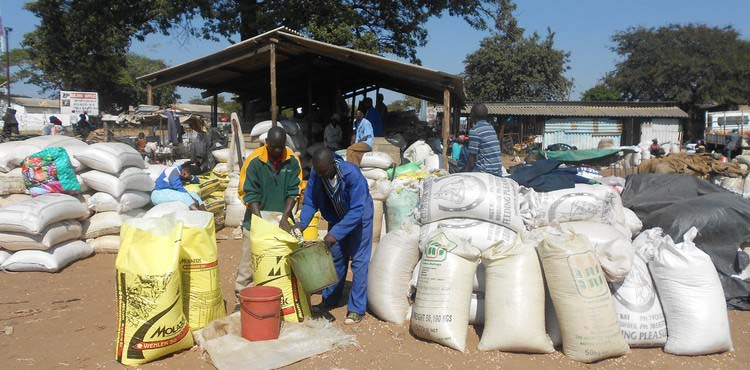Perspectives from agricultural markets


The soil has a way of locking fertiliser so that crops do not use it. It is this complexity around the whole farming ecosystem that has to be understood by all value chain actors including financiers
Charles Dhewa
Agribusinesses in Zimbabwe should stop conducting their activities in isolation if they really want to stay in business. Besides aligning their activities closely with customers, they can benefit from closely observing how informal traders deal with the growing complexity of the agriculture sector. Harmonisation of data collection and interpretation can ensure agribusinesses do not just sleep-walk through opportunities.
The capacity to recognise change as it happens seems to be lacking in most agribusinesses most of which resort to copying each other. On the other hand, the lack of unique and reliable agribusiness templates has led to no consensus on which best practice models to follow.
An eye on constraints and trends
Another complication for agricultural value chain actors is the multiplication of different and sometimes contradictory sources advice and information. Trends from informal agriculture markets and the whole informal food economy can inform some of the choices that will enable serious agribusinesses to adapt and shape their approaches for higher performance.
To be viable, agribusinesses and all value chain actors have to stay alert to many issues. For instance, while weather information is important, it is not sufficient without a granular understanding of each farmer’s soils.
As a result, anticipating yields on the basis of rainfall received or inputs distributed can be misleading. Some soils have become too tired to utilise all inputs including water. A common view among many agronomists is that for any soil pH below 4,5, fertiliser that is applied to the soil is not made available to crops.
The soil has a way of locking that fertiliser so that crops do not use it. It is this complexity around the whole farming ecosystem that has to be understood by all value chain actors including financiers.
Responding to a changing climate and market conditions
The pressure exerted by climate change on agricultural value chains is making optimisation of scarce resources very urgent. One of the reasons why banks are no longer interested to fund agriculture is because they have developed a low risk appetite for agriculture.
If there were accurate ways of gathering and analysing climate risk data as well as accurate understanding of consumer power, banks would get back to financing agriculture the way they did a few decades ago when the agriculture sector was predictable. To get rid of unwanted exposure they banks are seating on the fence.
Unfortunately, risk is largely misunderstood and, therefore, miscalculated in the agriculture sector. Extension services can play a critical role in helping other value chain actors understand issues surrounding agricultural risk and financing.
Since there is no template for how extension services can play this role efficiently, Government extension officers are hesitant to take the responsibility for interpreting risk in ways that optimise production for the benefit of all value chain actors including financial institutions. The main reason is that they do not have adequate information for matters like market dynamics that are outside their control.
The power of a superior market perspective
There is no doubt that one of the key economic drivers in the agriculture sector has become a superior market perspective which feeds the capability to identify opportunities. Unfortunately, talent for executing such roles is lacking in all African countries including Zimbabwe.
While every farmer wants direct market access, the definition of market continues to shift. Selling to hotels which just need 100 kilogrammes of tomatoes per week is not useful even if one may have direct market access.
You cannot build a meaningful business on the basis of such meaningless numbers. An essential role for knowledge brokers, which farmers and other actors do not adequately acknowledge, is the aggregation of risk and funding information from across the whole value chain in order to inform strategic decisions as well as provide oversight and some kind of control.
This role requires superior analytics and sophisticated tools that will produce credible evidence. Traditional weather forecasting tools and financial modelling techniques are losing influence due to increasing sophistication of the knowledge required by value chain actors.
Working as a complete ecosystem, the whole agricultural value chain badly needs capabilities for revealing the holistic nature of value chains. The nature of each value chain should be reflected in the multitude of key performance indicators, demonstrating that the value chain is actually an institution. All components have to be considered in ways that ensure the value chain does not lose its power to influence the behaviour of each value chain actor.
Influencing direction and growth through co-ordination
What is also emerging is the increasing need for coordination among all value chain actors. Each value chain requires excellent data to fulfil its tasks and comply with regulations. Without high-quality market information, it is impossible to gain superior insights about the whole agricultural sector.
At the moment, there is proof that poor data is the single most important constraint preventing agricultural value chain actors from performing to their full capacity. For instance, most food processing companies are operating at below 50 percent due to unreliable supply of raw materials.
Without data it is difficult to influence future investments in the agriculture sector. How do you convince investors to invest in the tomato value chain or livestock value chain without precise data on commodities available for the market per given period and consumer buying power?
A culture of data is needed without delay if value chain actors are to get a global overview of the agriculture sector. Although it may not be practical for every value chain actor to memorise every detail, real- time data will foster transparency and build confidence in the value chain.
Organising for efficiency and success
Building a data-driven culture along agricultural value chains will ensure institutions that co-ordinate value chains do not lose a centralised overview of the whole agricultural ecosystem. This can happen if value chain actors work closely, starting by clearly defining roles and responsibilities.
Incentives should also be properly aligned in ways that ensure everyone carries their own load. Rather than expecting private sector companies to provide information for free, there should be an in-built incentive system so that those providing business intelligence do not feel like losers.
One of the reasons farmers often cry foul and blame “middle-men” is because they are not conversant with external factors such as market liquidity, the cost of funding and interdependencies between different value chain actors. The ideal situation is where all value chain actors including farmers have access to a trusted tool kit that provides superior insights about the whole agricultural sector.
Instead of waiting for information from anywhere, farmers should earn the right to be part of strategic discussions and business decisions in agricultural value chains by contributing to on-going conversations.
Fundamentals of success along agricultural value chains
Availability, analysis and interpretation of information is a fundamental success factor in the agriculture sector. There is a huge difference between news and superior decision-making information. Those co-ordinating the value chains should ensure the quality and availability of data is sufficient to generate superior business insights as opposed to general information and news.
To optimise the whole value chain, risk and finance data needs to be integrated.
For instance, it should be clear whether the poultry value chain is a billion dollar industry or it is worth just a few million dollars. Such details will enable combining of diverse perspectives with information about finance, risk and other critical success factors. Responding to the prevailing complexity in the agriculture sector requires good choices based on data as opposed to institutional bias and piecemeal information.
The agriculture sector cannot rely on a single template such as contract farming. Data from many sources can surface better choices, patterns and tools that are driving agriculture as an ecosystem.
Charles Dhewa is a proactive knowledge management specialist and chief executive officer of Knowledge Transfer Africa (Pvt) (www.knowledgetransafrica.com) whose flagship eMKambo (www.emkambo.co.zw) has a presence in more than 20 agricultural markets in Zimbabwe. He can be contacted on: [email protected] ; Mobile: +263 774 430 309 / 772 137 717/ 712 737 430.







Comments